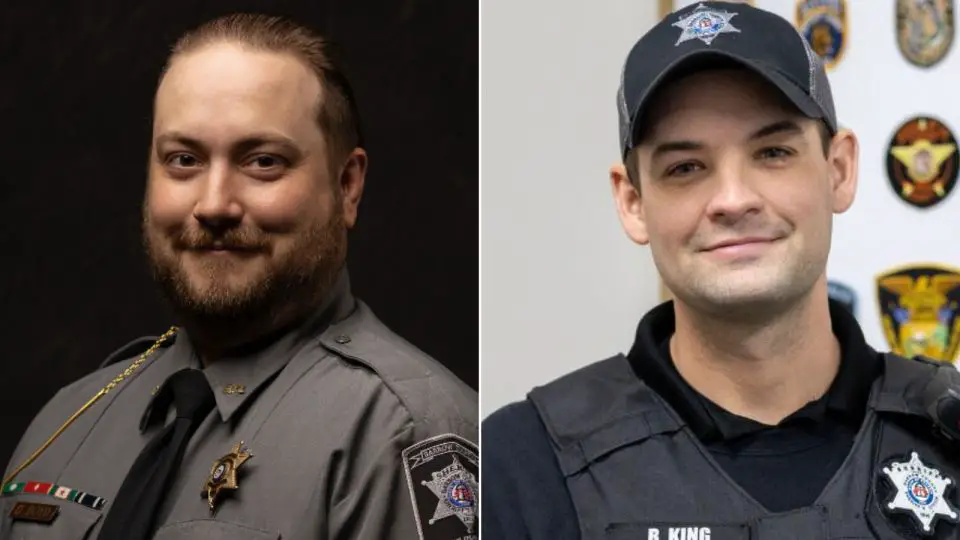School resource officers Chase Boyd and Brandon King ran toward the sound of gunfire, rounding a corner inside a Winder, Georgia, high school to find a hallway shrouded in dust and smoke – and through the haze, the silhouette of a shooter.
“The reason he is still alive is because we couldn’t see him to shoot him,” Boyd told the Barrow News-Journal of the 14-year-old accused of opening fire on September 4 at Apalachee High School, killing two students and two teachers. Seven others were wounded.
The officers’ comments to the newspaper were their first public accounting of the shooting, which authorities previously said ended with the gunman surrendering to the deputies once confronted.
“God was a huge factor that day,” King said, also nodding to the training he and Boyd had undergone prior to the shooting. “If it wasn’t for God, I wouldn’t be here today … We did what God put us here to do.”
The Barrow County Sheriff’s Office declined a CNN request to interview the deputies Thursday, saying they were unavailable.
A series of revelations in the aftermath of the shooting have raised questions about whether more could have been done to prevent it. Particular focus has been paid to the accused shooter’s father – who allegedly provided his son access to the weapon used despite knowledge of his deteriorating mental health – and his mother’s claim she called the school that morning to warn of an “extreme emergency” after receiving a concerning text message from her son. The sheriff has said there was no prior warning of a possible threat.
But the deputies and their swift response have been credited with halting the gunfire before the shooter could claim more victims. And it highlights the crucial role law enforcement can play in the early moments of a school shooting, offering a contrast to cases like the 2022 shooting at a Uvalde, Texas, elementary school, where scores of officers waited 77 minutes to confront a gunman who killed 21 people, mostly children.
“Our mindset needs to be that we will probably get shot,” Boyd told the News-Journal.
“Whether or not we die is a coin flip,” he added, “but our job is to stop the shooter from taking more lives.”
Barrow County Sheriff Jud Smith – who previously told CNN affiliate WANF Boyd and King were “the true heroes” – confirmed to CNN the deputies’ experience had already prompted changes to his agency’s active shooter training, inspiring the use of smoke machines to imitate a low-visibility environment.
‘We’re just ordinary people’
Boyd usually works at a different school, the News-Journal reported, but had gone to Apalachee High that morning to drop off a Bible to a student there. When the shooting started, the pair of school resource officers were in the school’s atrium talking about that evening’s Bible study, which would focus on Ephesians 6:10-18.
The first two verses of one translation read:
When the gunfire erupted, it sounded “like a muffled snare drum” because of the way the sound traveled through the school’s hallways, Boyd said. Several teachers, he said, had mistakenly believed the sound of gunfire was students kicking lockers.
The two deputies ran toward the sound, they told the newspaper. “It wasn’t until we kept getting closer, then it started registering more like the sound of gunfire,” said King.
The News-Journal reported it took just one verbal command for the shooter to surrender, dropping the AR-style rifle investigators said he’d concealed in his backpack that morning. The Georgia Bureau of Investigation has said the gunman was apprehended at 10:26 a.m. – several minutes after law enforcement received the first reports of an active shooter.


“My personal belief is whatever demon or whatever was in that kid to make him do pure evil … left when God rounded that corner,” Boyd told the News-Journal.
“We’re just ordinary people,” Boyd said. “Throughout scripture, you can see where God uses ordinary people to do extraordinary things.”
The deputies have since been working to comfort the school community still reeling from the shooting eight weeks later, and to assure them of their safety.
“We want to help give comfort to the students and staff that they’re as safe as they can possibly be with us here,” King told the newspaper.
“We want everyone to know how quickly we reacted — not for recognition, but for their peace of mind,” he added. “It wasn’t hours or minutes. It was seconds.”
For more CNN news and newsletters create an account at CNN.com


Leave a Comment